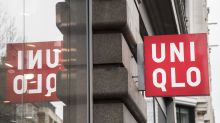Fast Retailing Co., Ltd. (FRCOY)
Other OTC - Other OTC Delayed Price. Currency in USD
Add to watchlist
At close: 03:46PM EDT
| Previous Close | 27.48 |
| Open | 28.48 |
| Bid | 0.00 x 0 |
| Ask | 0.00 x 0 |
| Day's Range | 27.35 - 28.48 |
| 52 Week Range | 20.75 - 32.08 |
| Volume | |
| Avg. Volume | 31,387 |
| Market Cap | 85.378B |
| Beta (5Y Monthly) | 0.67 |
| PE Ratio (TTM) | 38.63 |
| EPS (TTM) | 0.71 |
| Earnings Date | N/A |
| Forward Dividend & Yield | 0.20 (0.73%) |
| Ex-Dividend Date | Aug 30, 2023 |
| 1y Target Est | 31.71 |
 WWD
WWDWhat Happens When You Combine Uniqlo, Andy Warhol’s Art and Kaws?
Uniqlo is taking the lead as presenting sponsor of an exhibition featuring Andy Warhol's and Kaws' works.
 Fortune
FortuneGen Z women flock to Uniqlo as return-to-office mandates force them to merge work and evening wear
Uniqlo's U.K. boss says shoppers want clothes they can wear “at the office or on a night out,” in latest work-related buying shift.
 PA Media: Money
PA Media: MoneyYoung women fuelling demand at Uniqlo, UK chief says
Alessandro Dudech said Generation Z shoppers want clothes that they can wear both ‘at the office or on a night out’.’